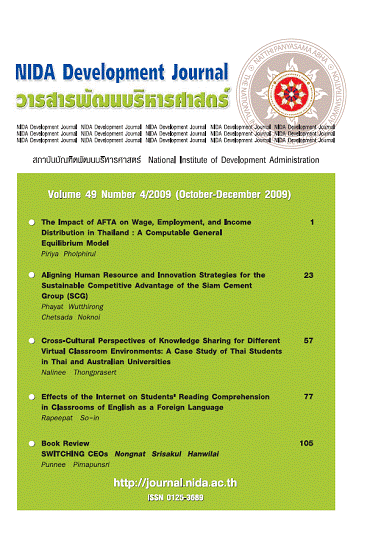The Impact of AFTA on Wage, Employment, and Income Distribution in Thailand: A Computable General Equilibrium Model
Keywords:
ASEAN Free Trade Area, Wage and Employment, ThailandAbstract
This paper adopts the Computable General Equilibrium (CGE) technique to analyze the impacts of tariff reduction under AFTA’s scheme concerning wage earning and employment outcomes in Thailand. In aggregate terms, Thai laborers are expected to gain from the full implementation of AFTA. By sectoral differential, the impacts of AFTA on wage and employment outcomes of Thai workers are varied, depending on production intensity, rate of substitution between inputs, and linkages.
งานศึกษานี้ใช้เครื่องมือแบบจำลองดุลยภาพทั่วไป (Computable General Equilibrium) ในการวิเคราะห์ผลกระทบของการลดภาษีภายใต้กรอบการค้าเสรีอาเซียน (AFTA) ต่อค่าจ้าง, การจ้างงาน, และการกระจายรายได้ในประเทศไทย โดยพบว่า ถึงแม้แรงงานไทยจะได้รับประโยชน์จากเปิดการค้าเสรีอาเซียนก็ตาม แต่ผลที่ได้กลับแตกต่างในแต่ละสาขาการผลิตโดยขึ้นอยู่กับ ความเข้มข้นของการผลิต, การทดแทนกันของปัจจัยการผลิต, และการเชื่อมโยงในแต่ละสาขาการผลิตเป็นสำคัญ





